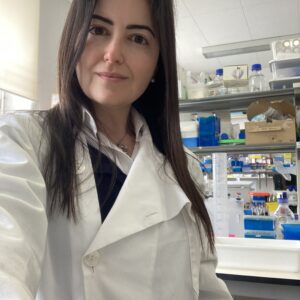At a glance
| Title | Redox-responsive self-immolative nanogels for cellular immunotherapies |
| Reference | 2022.15560.UTA |
| Scientific Area | Nano Materials for New Markets |
| Funding (PT) | 50 000 EUR |
| Funding (US) | 100 000 USD |
| Leading Institutions | Centre for Innovative Biomedicine and Biotechnology – University of Coimbra, PT
Biomedical Engineering Cockrell School of Engineering – The University of Texas at Austin, USA |
| Participating Institutions | |
| Duration | 15 months |
| Start date | June 1, 2024 |
| End date | August 31, 2025 |
| Keywords | Nanogel; Gene Delivery; T Cells; Glyocpolymers |
What is NanogeT about?
Cellular therapies, namely adoptive immunotherapies, have been established as one of the most promising treatments in non-solid cancers. The very promising results show a sustained and long remission in patients with previously incurable chemotherapy-refractory disease.
This therapeutic approach uses the patient own immune system to specifically recognize and eliminate cancerous cells. Although holds great therapeutic potential, the viral-based genetic manipulation of these engineered immune system cells makes this therapy extremely expensive and, therefore, a considerable burden for national healthcare systems.
The use of a non-viral gene delivery method can be a promising alternative to significantly reduce the production costs since does not require special facilities as viral-based one requires. Moreover, using a non-viral gene delivery platform could facilitate the process of engineered immune system cells production at large scale.
NanogeT project intends to be the cutting-edge of a new generation of non-viral gene delivery nanosystem to transfect T cells by: (i) fashioning well-defined cationic glycocopolymers; (ii) combine these cationic glycopolymers, a redox-responsive and self-immolative chemical crosslinker, and a plasmid DNA (pDNA) in a nanogel prepared by a straightforward protocol and with precisely tuned physicochemical and biological properties.
What critical challenges is NanogeT addressing?
NanogeT proposes unique affordable toolboxes for the engineering of T cells. With this ground-breaking concept, it is expected to pave the way to solve some of the major challenges faced by cellular immunotherapies: cost and availability. Moreover, the developed nanogel is envisioned to serve as a broad platform for the genetic cell engineering of other types of cells. Once we successfully overcome the challenges of NanogeT, our nanomaterial has the potential to be exceptionally rewarding to the scientific and medical communities.
How will NanogeT optimize cellular immunotherapies?
The methodology to be implemented in NanogeT project is divided in three different but interconnected research tasks:
(1) Synthesis and characterization of well-defined cationic glycocopolymers with different compositions using controlled/living radical polymerization techniques;
(2) Preparation and characterization of a redox-responsive self-immolative nanogel to carry plasmid DNA through a nucleic acid-friendly way;
(3) Evaluation of the developed nanogels to transfect T cells. Many tasks to be developed will be highly risky, but contingency plans will be contemplated to mitigate risks. Overall, the sequence of tasks within the project will permit to engineer T cells through an acceptable cost-effective non-viral protocol.
How is NanogeT contributing to nanomaterial and cancer research?
The NanogeT project revolutionizes cancer treatment by employing nanotechnology, promising accessible, less toxic therapies. Its affordable manufacturing process enhances healthcare technology capacity, making treatments more widespread. This collaborative effort validates international and multidisciplinary approaches to global challenges, inspiring collective action in scientific advancement. The project’s success signals potential for new research areas and innovations, reshaping the landscape of cancer care and healthcare technology, ultimately improving the quality of life for millions worldwide.
Key Expected Outcomes
- 1 peer-reviewed scientific article;
- 2 international conferences participation;
- 1 master’s dissertation;
Research Exchanges
2025 – Rosemeyre Cordeiro
Principal Investigator, Faculty of Medicine, University of Coimbra and Visiting Researcher at UT – Download the visit report here.

